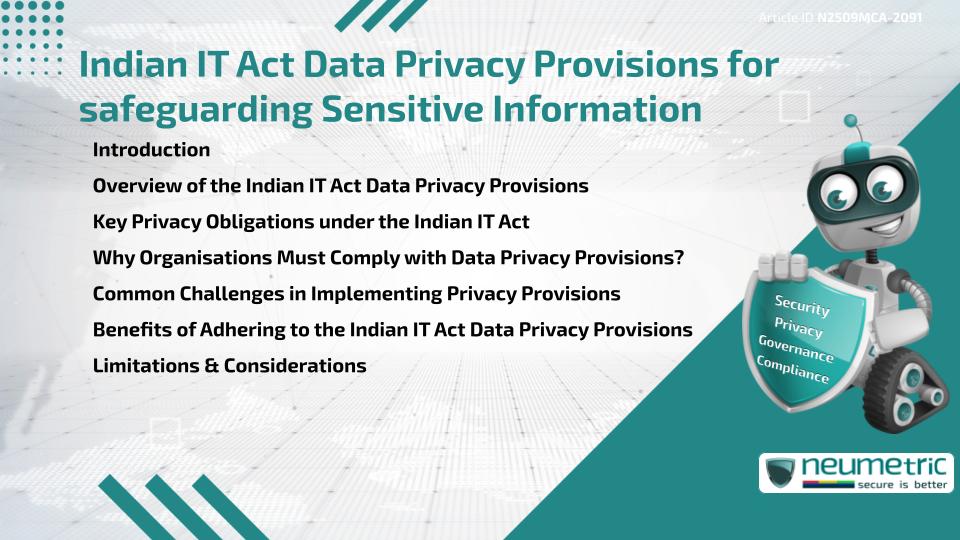Table of Contents
ToggleIntroduction
The Indian IT Act Data Privacy provisions establish a Legal Framework for protecting Personal & Sensitive Information in India. As part of the Information Technology Act, 2000 & subsequent amendments, these provisions hold Organisations accountable for Data Protection & Impose obligations on How sensitive Personal Data is collected, processed & shared. This Article outlines the key Privacy provisions, their importance, challenges & benefits for organisations.
Overview of the Indian IT Act Data Privacy Provisions
The Information Technology Act, 2000, along with the 2008 amendment & associated rules, provides the foundation for Data Protection in India. The most significant is the Information Technology (Reasonable Security Practices & Procedures & Sensitive Personal Data or Information) Rules, 2011.
These rules define what constitutes Sensitive Personal Data or Information [SPDI], such as Passwords, Financial Information, Health Records & Biometric details. Organisations handling SPDI must adopt reasonable Security practices to safeguard it. For more details, visit the Ministry of Electronics & IT.
Key Privacy Obligations under the Indian IT Act
- Consent Requirement – Organisations must obtain Consent before collecting or processing SPDI.
- Purpose Limitation – Data must only be used for the purpose it was collected.
- Disclosure Restrictions – SPDI cannot be shared with Third Parties without prior consent, except under Lawful Obligations.
- Data Retention – Information should only be retained as long as necessary for the stated purpose.
- Security Practices – Organisations must implement reasonable Security Measures, often aligned with ISO 27001 Standards.
- Grievance Redressal – A designated Officer must address Data Privacy concerns from Individuals.
For comparison, see OECD Privacy guidelines.
Why Do Organisations Must Comply with Data Privacy Provisions?
Non-Compliance with the Indian IT Act Data Privacy provisions can lead to Regulatory Action, Reputational Damage & Loss of Customer Trust. With increasing reliance on Digital Services, safeguarding SPDI is critical for:
- Meeting Legal Obligations.
- Preventing Data Breaches & Misuse.
- Building Client & Customer confidence.
- Ensuring alignment with Global Privacy expectations.
The NASSCOM Data Protection resources highlight the growing importance of Privacy in India’s digital economy.
Common Challenges in Implementing Privacy Provisions
- Awareness Gaps – Employees often lack Knowledge of Legal Obligations.
- Evolving Data Ecosystems – Complex Data flows increase Compliance Risks.
- Third Party Risks – Outsourced Services & Vendors may create Vulnerabilities.
- Resource Limitations – Smaller Organisations may struggle with implementation Costs.
The NCSC UK Data Protection collection provides helpful practices to address such challenges.
Benefits of Adhering to the Indian IT Act Data Privacy Provisions
- Legal Compliance – Reduces exposure to Penalties & Litigation.
- Stronger Security Posture – Protects against Breaches & Cybercrime.
- Reputation & Trust – Demonstrates Accountability to Customers & Regulators.
- Business Advantage – Enhances Credibility in Domestic & International Markets.
Limitations & Considerations
The Indian IT Act Data Privacy provisions provide a foundation but are limited in Scope compared to Global Frameworks like GDPR. Upcoming regulations, such as the Digital Personal Data Protection Act, 2023, will further expand Privacy Obligations. Organisations must stay updated & adapt practices accordingly.
Takeaways
- The Indian IT Act Data Privacy provisions regulate the collection, processing & protection of Sensitive Information.
- Obligations include Consent, Purpose Limitation, Security Practices & Grievance redressal.
- Compliance strengthens Trust, reduces Risks & ensures Legal Protection.
FAQ
What are the Indian IT Act Data Privacy provisions?
They are rules under the Information Technology Act that govern the handling of Sensitive Personal Data or Information.
What is considered Sensitive Personal Data?
Passwords, Financial Data, Health Records, Biometrics & Similar Information.
Who must comply with these provisions?
Any organisation or entity handling SPDI in India.
Are there Penalties for Non-compliance?
Yes, organisations may face Legal Liability & Compensation claims for negligence.
How do these Provisions compare to Global Standards?
They provide a baseline but are less comprehensive than GDPR. New laws aim to address this Gap.
References
- Ministry of Electronics & IT – Government of India
- OECD – Privacy Guidelines
- NASSCOM – Data Protection Resources
- NCSC UK – Data Protection Guidance
- IT Governance – Data Protection Resources
Need help for Security, Privacy, Governance & VAPT?
Neumetric provides organisations the necessary help to achieve their CyberSecurity, Compliance, Governance, Privacy, Certifications & Pentesting needs.
Organisations & Businesses, specifically those which provide SaaS & AI Solutions in the Fintech, BFSI & other regulated sectors, usually need a CyberSecurity Partner for meeting & maintaining the ongoing Security & Privacy needs & requirements of their Enterprise Clients & Privacy conscious Customers.
SOC 2, ISO 27001, ISO 42001, NIST, HIPAA, HECVAT, EU GDPR are some of the Frameworks that are served by Fusion – a SaaS, multimodular, multitenant, centralised, automated, CyberSecurity & Compliance Management system.
Neumetric also provides Expert Services for technical Security which covers VAPT for Web Applications, APIs, iOS & Android Mobile Apps, Security Testing for AWS & other Cloud Environments & Cloud Infrastructure & other similar scopes.
Reach out to us by Email or filling out the Contact Form…





